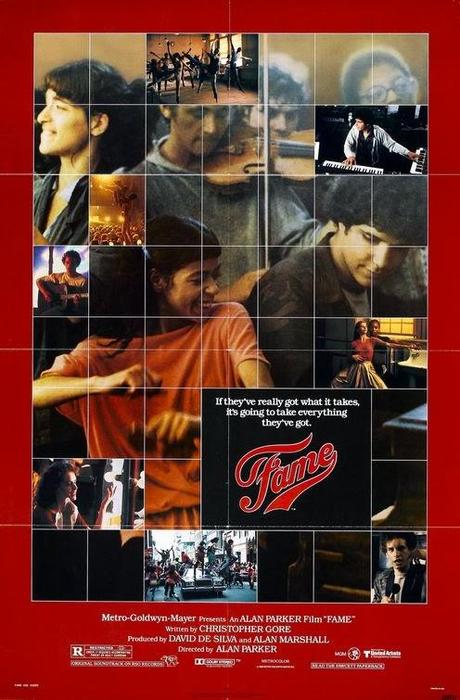
Directed By: Alan Parker
Starring: Eddie Barth, Irene Cara, Lee Curreri
Tag line: "If they've really got what it takes, it's going to take everything they've got"
Trivia: This was the first film in the history of the Academy Awards to have two songs nominated in the Best Song category: the title song, written by Michael Gore & Dean Pitchford and "Out Here On My Own" written by Michael & Lesley Gore
Alan Parker’s 1980 film, Fame, spawned both a popular television series (which aired in the U.S. from 1982 to 1987) and a 2009 remake, neither of which matched the raw power of the original. Despite what its title may suggest, Fame is far from an inspiring story; it’s the deeply dramatic, sometimes troubling tale of a group of talented kids who, regardless of their hard work and determination, will more than likely fail to realize their dreams.
Fame follows a handful of students as they make their way through four years at the New York School of Performing Arts. Montgomery (Paul McCrane) and Doris (Maureen Teefy) are enrolled in the Drama program, as is Ralph Garci (Barry Miller), whose ultimate goal is to be a stand-up comedian like his idol, Freddie Prinze Jr. Bruno (Lee Curreri) is a music major specializing in electronics and synthesizers, and he partners up with Coco (Irene Cara), a dancer with a tremendous singing voice. Leroy (Gene Anthony Ray) is also a dancer who, despite his amazing talent, may be thrown out of school for failing English.
Favoring gritty realism over the standard “rags to riches” storyline, Parker’s Fame pulls no punches, giving us genuine characters that face very real problems. As an exercise for their acting class, Montgomery and Doris must perform a monologue, during which they have to reveal something about themselves. Montgomery uses his time to discuss his homosexuality (while commonplace today, this subject was much more risqué in the early ‘80s). There are plenty of insecurities as well; Bruno, an excellent musician, refuses to let anyone hear his compositions, claiming at all times they’re “not ready”, while Leroy clashes openly with Mrs. Sherwood (Anne Meara), his English teacher, whenever she presses him to read a book (as it turns out, Leroy is illiterate). Yet, for these characters, the most troubling realization is that there’s no guarantee of success, even for the best and brightest of them. During her freshman year, Doris had a crush on Michael (Boyd Gaines), the school’s most promising senior, who, after graduation, was heading to L.A., where he planned to sign with the William Morris Agency. Two years later, when Doris, Montgomery, and Ralph are out to dinner, they run into Michael again, and are shocked to discover he’s working as a waiter. L.A. didn’t pan out, he says, and thus far, New York hasn’t been any kinder to him. It’s a harsh reminder that the odds are stacked against these characters, and the film’s grand finale, when the students perform “I Sing the Body Electric” during their graduation ceremony, is bittersweet because we know that, for the vast majority, it’ll be the last time they’re ever be in front of an audience.
Yet as impressed as I was with its realism, it’s the movie’s musical numbers that really stand out. The best of the bunch (not to mention one of my all-time favorite musical sequences) features the film’s title track, “Fame”, performed by Irene Cara. It begins when Bruno’s father (Eddie Barth), a cab driver, pulls his taxi up to the front of the school, a pair of speakers mounted on the vehicle’s roof. Hoping to show the world how talented his son is, he pops in one of Bruno’s tapes and plays it as loudly as he can, right there on the side of the road. Before long, the street is filled with students, who stop traffic as they gleefully dance on top of the cars. It’s a highly theatrical scene, to be sure, a sharp contrast to the film’s otherwise realistic approach. But despite the artificiality of it all, this sequence has a life-affirming quality, and an exuberance that’s hard to resist. Throughout the movie, these characters face many trials and tribulations as they perfect their craft. It’s moments like these that remind them why they’re doing it in the first place.
